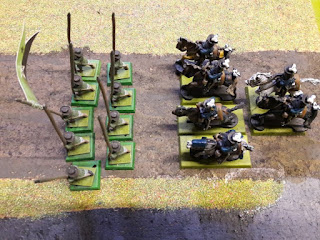2.2 Ten Days in May - Manouvres and Money
After
retiring from the field and having to gather his forces again, which
took a couple of days, Marquess Raffham, Thomas Kirby temporarily split
his forces, recruiting an infantry unit out of Raffham and a cavalry
unit from Stanton Brimard. Uncertain of the how secure Farren Mill was,
he decided against another unit directly from there. Marching with the
two Raffham units and artillery, Kirby headed to Maidenpool and sat down
there to bring the town under Parliamentary control. He was forced to
find new recruits for the scout cavalry which was suffering from a dip
in morale after being chased off the field.
Sir
Clive Camberwell rode across country to Stanton Brimard, where he
raised a new horse unit, leaving Sir Lyall Wetherick to march the foot
units into Farren Mill and assume control, there.
Lord
Stewart, doubting that Langley would attempt another move nortwards
until he had a substantially more powerful force, left Major Edward
Delaney and the 1st Keswick at Candleridge and marched on Turnwall,
taking the artillery with him as the partially walled town may resist
efforts to bring it under control. Not everyone in Turnwall was ready
to submit to demands from Parliament and a local militia quickly took
possession of the gates and walls, resisting the initial attempt to
seize the town. Stewart, irritated by this, deployed the artillery and
began the business of reducing the defence.
In Greysby,
Connal Murray and his highlanders soon had the town subdued and marched
in to demand taxes towards the Parliamentary cause. Sir Owen Kentigern
had taken a role as second in command under Murray and seemed to be
satisfied with this. They established a camp just west of the main town
and began to plan an attack on Rivenbridge. Murray's fanatics were
impatient to be away and making war against Barret, Campbell and Laidlaw
all of whom they regarded as traitorous.
In the south,
Kirby was concerned for the force holding at Frinton and sent orders
that Sir Henry Tremayne should organise a horse unit immediately and
then consider raising more troops to ensure that they could defend
themselves until help arrived from the north.
Langley and
his forces had not been idle, either. The Republicans desperately
needed funds. Hopton had begun bombarding Hornborough castle with the
refusal of the town or the Earl of Easthold to surrender up taxes and
territory. The ex-royalist, Sir Fengrove Parry occupied the castle,
closed the gates of the town and using his militia and local guards,
stood firm.
Sir
Geoffrey Morton had marched from Newchurch but finding the way blocked
by the forces at Frinton, went north across country and set up an
encampment about twenty miles east of Eden Wells, sending letters to Sir
Percival Blake, emploring him to join their cause. Blake had been a
royalist who changed sides to support Parliament and since, had become
an active political figure. The only issue was that, while he got on
well enough with Morton and Hopton, he showed a distaste for Charles
Langley.
Finding no gains out of either of these
manouvres, Langley himself sent word to Hopton who purchased a supply
train and sent spare coin as well as hay, vegetables and fruit to help
out Langley's pressured position. Using some of the coin, Langley had
Sir Paxton Gilbert recruit a foot unit from Stourwold and both marched
to meet at Wilcombe, which they swiftly took despite some protests from
Sir Landon Fitzwalter, who was related to the Parliamentarian, Sir James
Fitzpatrick.
In the north, Barrett's forces were
running out of coin and supplies. He had to gamble on Murray not making
an immediate advance, despatching Campbell to Albridge to bring that
small town under their aegis and, leaving Laidlaw to hold Rivenbridge,
Barrett rode to Edenwood to approach Sir Stafford Le Grange who leaned
towards Langley although he had also been a royalist politician.
Fortunately for him, Campbell put down any resistance from Albridge in
his usual harsh manner and Le Grange responded positively, making it
clear that he did not want to see Kirby and his "left-wing populists" in
control of the state. The addition of Edenwood and Albridge gave
Barrett access to a usable war chest and the army could be paid. Le
Grange lost no time in raising men at Edenwood and by the end of the
period, they were ready to head back to Rivenbridge while Campbell
camped outside Albridge.



No comments:
Post a Comment